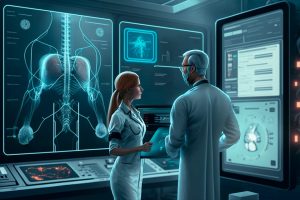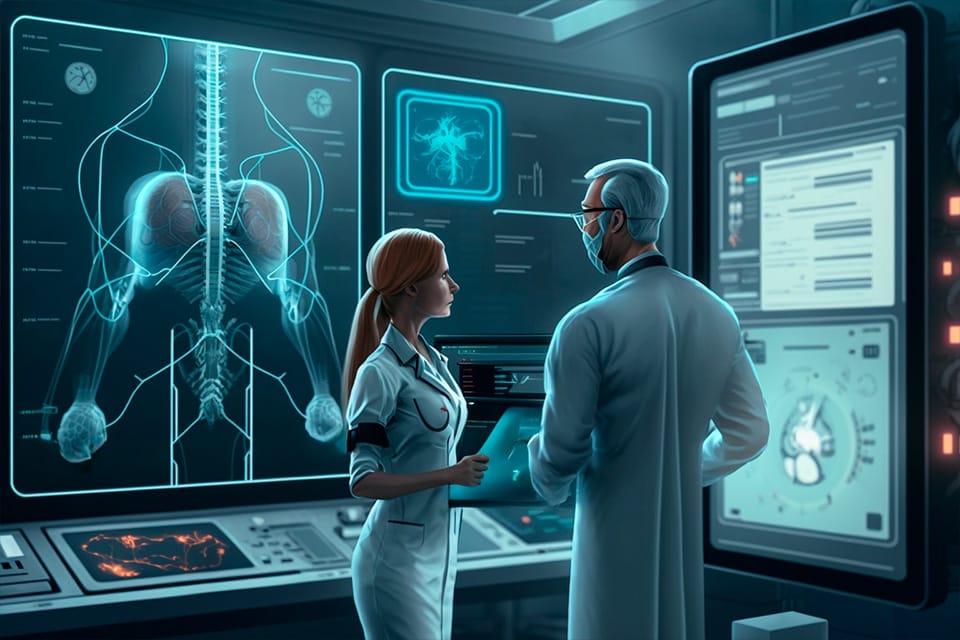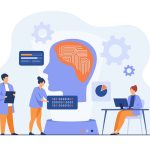Introduction:
Artificial Intelligence (AI) has been making significant strides in various fields, but perhaps none more promising and impactful than healthcare. The fusion of advanced algorithms, big data analytics, and machine learning has the potential to revolutionize how we diagnose diseases, provide treatment, and manage patient care. In this article, we explore the fascinating world of AI in healthcare and its potential to transform the medical landscape.

Diagnosis Redefined:
One of the most remarkable aspects of AI in healthcare is its ability to enhance the accuracy and speed of diagnosis. Traditional diagnostic methods often rely on the expertise of human clinicians who might occasionally miss critical details or patterns due to the sheer volume of information they must process. AI, on the other hand, can quickly sift through vast amounts of medical data, including patient records, imaging scans, and lab results, to identify patterns and anomalies that may elude even the most seasoned professionals.
Radiology is a prime example of AI’s diagnostic prowess. Machine learning models have been trained to analyze medical images like X-rays, MRIs, and CT scans with incredible precision. These AI systems can spot abnormalities, tumors, fractures, and other conditions with high accuracy. Moreover, they can do so in a matter of seconds, reducing the time it takes to provide critical diagnoses and enabling early intervention.
Treatment Personalization:
AI’s impact extends beyond diagnosis; it plays a vital role in personalizing treatment plans for patients. Every individual’s health is unique, and what works for one patient may not be effective for another. AI can analyze patient data, genetic information, and historical treatment outcomes to tailor treatment plans that are more likely to succeed. This not only improves patient outcomes but also reduces unnecessary treatments and side effects.
Drug discovery is another area where AI shines. Developing new medications is a time-consuming and expensive process, often taking years to bring a drug from the lab to the clinic. AI-powered algorithms can analyze vast datasets of molecular information to identify potential drug candidates and predict their efficacy, significantly speeding up the drug discovery process and potentially leading to breakthrough treatments for various diseases.
Enhancing Patient Care:
Beyond diagnosis and treatment, AI is also reshaping the way healthcare is delivered. Chatbots and virtual health assistants are becoming increasingly common, providing patients with 24/7 access to healthcare information and guidance. These AI-powered systems can answer questions, schedule appointments, and even monitor patients’ conditions remotely.
Predictive analytics, another AI application, can help hospitals and healthcare providers forecast patient admission rates, optimize resource allocation, and prevent overcrowding during peak periods. By analyzing historical data and real-time information, healthcare facilities can ensure that they are prepared to meet the needs of their patients more efficiently.
Challenges and Ethical Considerations:
While the potential benefits of AI in healthcare are immense, they are not without challenges and ethical considerations. Data privacy and security are paramount concerns, as patient information must be protected from breaches and misuse. Additionally, the “black-box” nature of some AI algorithms can make it challenging to explain their decisions, raising questions about transparency and accountability.
Conclusion:
Artificial Intelligence is poised to transform healthcare in ways we could only dream of a few years ago. From more accurate and rapid diagnosis to personalized treatment plans and enhanced patient care, AI offers a multitude of opportunities to improve healthcare outcomes. However, it is essential to navigate these advancements carefully, addressing ethical concerns and ensuring that AI serves as a valuable tool in the hands of healthcare professionals. As AI continues to evolve, the future of healthcare promises to be healthier, more efficient, and more patient-centered than ever before.


